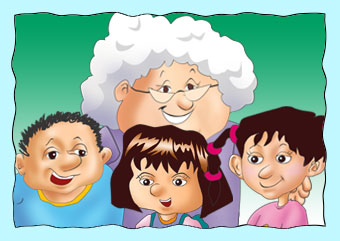Grammar: Word classes: Determiners: Referring to specific people, things, etc
| Possessives (my, your, his) |
The uses of possessive determiners
We use possessives to refer to, or point to, an 'ownership' relationship between the participants in a sentence (both in the sense of 'possession' and 'belonging to'):


|
Here the possessive her tells us that the grandchildren belong to Granny,
ie that they are part of her family.
Possessives express ownership through two systems: person
 and
number
and
number  .
.
Putting the concepts of person and number together, we get the following forms:
| Person | ||
speech role |
possessives | |
| singular | plural | |
| 'speaker' 1st person |
my | our |
| 'addressee' 2nd person |
your | your |
| 'other' 3rd person |
his, her, its one's |
their |
Note that the form one's (and also the pronoun one) refers to 'people in general', eg One should always honour one's parents. The forms one and one's, often called 'impersonal' or 'generic', are quite formal and usually only found in writing and very formal speaking. It is much more common to use the alternative forms you and your, eg You should always honour your parents. In this case you and your do not point to the person the speaker is talking to. Another alternative to one and one's is to use we and our, eg We should always honour our parents, but this is less common than you and your.
Note that the terms Pointer and Thing are written with an initial capital to remind us that they are functional terms.
|
||
To give us feedback about this section, click here or on the Comment button at the top of the screen.
If you have any questions about this section, visit the Language Corner.
If you have any questions or suggestions about how to teach this section, send a message to the Teaching Corner.